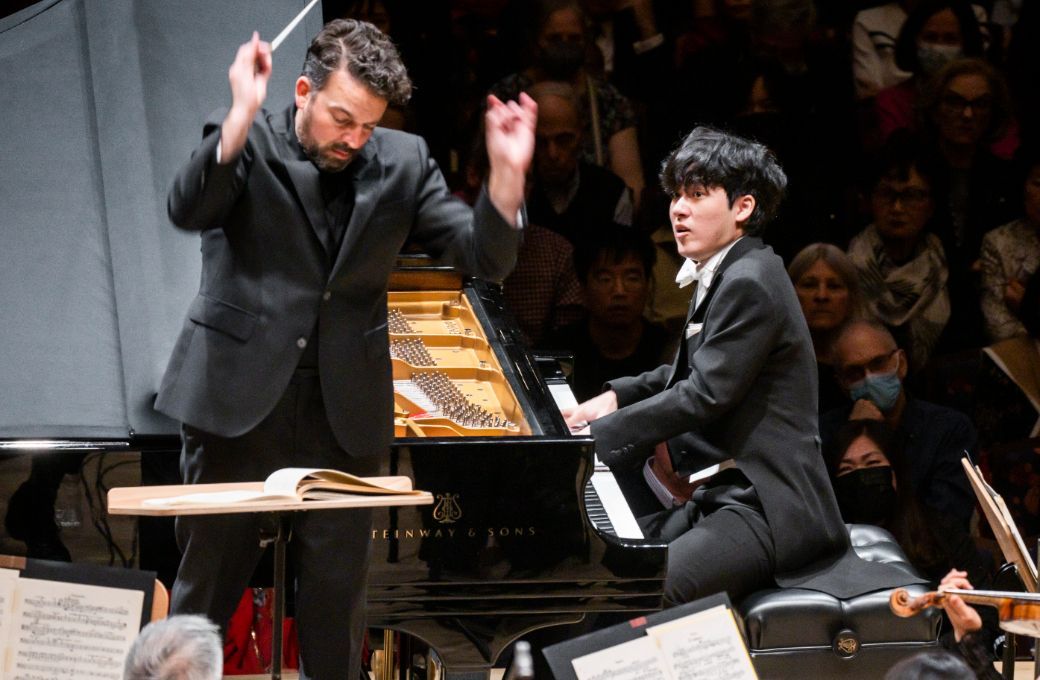Returning to the helm of the New York Philharmonic, James Gaffigan, incoming Music Director at Komische Oper Berlin, prefaced two important 20th-century Russian works with Valentyn Silvestrov’s Prayer for Ukraine. Conceived in response to a period of turmoil for his homeland, the work was meant, in the composer’s own words, as a reminder of “how fragile the civilisation is”. Recently performed in many of the world’s musical centres as a sign of reflection, sorrow and hope, the Prayer was rendered here in an adaptation for full orchestra by Eduard Resatsch that preserves the sense of introspection of the original choral version. The glorious and heartfelt simplicity of the score was evident in this Philharmonic premiere.

There couldn’t have been a greater contrast between the serene Silvestrov chant and the brutal, hysterical opening bars of Prokofiev’s Symphony no. 3 in C minor which Gaffigan started with decisive gestures. The intensity level soon subsided, to be picked up again in the Finale. The American conductor, replacing the initially announced Tugan Sokhiev, clearly mastered a score of great complexity, directly inspired by Prokofiev’s The Fiery Angel, his provocative opera placing a love triangle into a late-medieval era full of witchcraft, superstition and unfulfilled desires. Gaffigan seemed to be more preoccupied with painting the soundscape in large brushstrokes, carefully calibrating dynamics, rhythms and balances of power between sections than bringing forward individual accents or particularly bold harmonic transformations. In a rarely performed score, the NY Phil proved its cohesiveness, both in the delicate and anxious Andante and in the devilish Scherzo, with its complex partitioning of the strings.
The atmosphere in the packed Wu Tsai Theater was filled with excitement during the evening’s interval. Making his debut with the New York Philharmonic, the 19-year-old Yunchan Lim, the youngest winner of the Van Cliburn Competition to date, surpassed wildest expectations. His rendition of Rachmaninov’s popular and technically demanding Third Piano Concerto – the same one he played in the Van Cliburn final round – was, from all points of view, spellbinding. Of course, it wasn't just about Lim’s stunning technique with his unbelievable articulation, gossamer trills and blazing fast scales. The pianist’s ability to shape phrases, to bring forward hidden thematic material, to maintain a harmonious equilibrium between the melodic flow and the underlying structural framework was amazing for someone so young. It was during the organic transitions where the South Korean’s playing felt most unique. In the first movement, the return to extroversion maintained a whiff of the tenderness of the preceding daydream-like passages. In the finale, the alternation between thunderous fortissimos and intimate pianissimos seemed to allow one state of mind to linger into the other. Nonetheless, it was during the Intermezzo-Allegro, where Lim’s performance, combining tension and excitement, poetry and vigour, was the most astonishing.
There were subtle dialogues between piano and woodwinds in the outer movements, but generally, Gaffigan strove to provide a non-intrusive background to the dominating piano pace-setting. The orchestra’s introduction of the bleak, descent into despair theme of the Intermezzo was exquisitely played, without exaggerated pathos.
There were two encores. The second, Lyadov’s Prelude Op.57 no.1 with its Chopinesque expressivity, was less distinctive. Nevertheless, the Sonetto del Petrarca no. 104 from Liszt’s second book of Années de pèlerinage was given a rendition that was marked by the same amalgam of exceptional fluidity and passionate intensity that dazzled the public in Rachmaninov.


